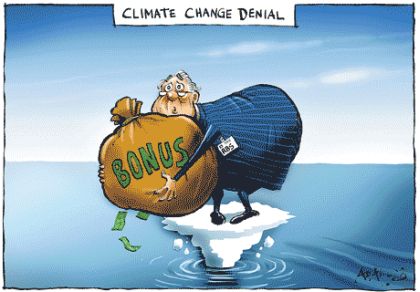
[The Telegraph, U.K.]
Estadao, Brazil
The Rich Show Their Hand at Copenhagen
"Prepared
by Denmark with the endorsement of the U.S. and Britain, the mere preparation of
this document makes it clear that the rich world refuses to pay the bill, both literally
and figuratively, for the rapid deterioration of the global climate."
EDITORIAL
Translated By Brandi Miller
December 10, 2009
Brazil - Estadao - Original Article (Portuguese)
The executive secretary of the
U.N. Framework Convention on Climate Change, Yvo de Boer, rushed to deny the
importance of the draft declaration, prepared for the Copenhagen Conference by Denmark
with the official endorsement of the U.S. and Britain, which was revealed
by the London newspaper, The Guardian. It's a proposal that goes
against the very spirit of the meeting, which has brought together delegations
from 192 countries. The text concretizes the interests of the industrialized
powers - the main emitters of the toxic gases responsible for raising the
earth's temperature. Furthermore, it divides poor nations between the more and
less vulnerable to the effects of global warming, and releases developed nations from
the obligation of assuming long-term financial commitments to help the rest of
the world mitigate and adapt to the consequences of the greenhouse effect.
In an attempt to place a heating
pad on the ill-feeling provoked by the release of the 13-page draft that carries
the fingerprints of the Danish prime minister, Lars Rasmussen, the host of the
summit, De Boer, said that the proposal was nothing more than an "informal
text," submitted for consultation before the summit - a trial balloon, in
other words. In fact, the document circulated discretely last week between
diplomats from a dozen countries, including Brazil. Given the general
disapproval, it was shelved. But its mere preparation makes it clear that the
rich world refuses to pay the bill, both literally and figuratively, for the rapid
deterioration of the global climate. The so-called "Danish text" is a
step backwards from what little has been done so far to prevent the worst.
The proposal would bury the Kyoto Protocol of 1997,
the only international treaty that commits developed countries to targets for cutting
emissions of greenhouse gases. The idea now is to make these compulsory for developing
countries as well. Two years ago at the U.N.
conference in Bali that paved the way to Copenhagen, there was an agreement
in principle for voluntary targets for reducing emissions in emerging countries
- with a guarantee of international financial assistance, regardless of their
exposure to the effects of warming. The Danish alternative would reserve this
aid only for the most vulnerable - to the tune of $10 billion annually from
2012 to 2015 - via the World Bank and not the United Nations. China's chief
negotiator, Su Wei, calculated that this is the equivalent to $2 per human
being. "With $2, you can't even buy a coffee in Copenhagen," he said.
Posted by WORLDMEETS.US
SEE ALSO ON THIS:
Guardian Unlimited:
Climate Summit in 'Disarray'
After Leak of 'Danish Text'
Frankfurter Rundschau, Germany:
The 'Grotesque Behavior' of the Climate Powers
Financial Times Deutschland, Germany:
Beijing Instead of Copenhagen
Hurriyet, Turkey:
History's Judgment of
Our Generation Depends
on Climate Summit

Perversely, however, rich
countries would have the right to emit more carbon per capita than other
countries until 2050: 2.67 tons compared to 1.44 for the developing world. No
wonder the chairman of the Group of 77, which brings is comprised of the developing
countries, Lumumba Stanislas Dia Ping of Sudan, says that the document destroys
the 1992
U.N. Climate Convention, the starting point for all debates on global warming.
The goal is to prevent temperatures from rising by more than 2 percent by the
end of the century. Therefore, the industrial powers would have until 2050 to
cut between 25 and 40 percent of their emissions. The scheme of the rich
countries is far from this. For its part, the group named BASIC (Brazil, South
Africa, India and China) tried, but apparently was unable, to come to a
consensus on an alternative proposal from China that in general retains the
philosophy of the Kyoto Protocol, would establish a Global Climate Fund and a
system for transferring anti-warming technology from rich countries to poor
ones.
The two drafts illustrate the
opposing positions on issues born of the conviction that global warming is a
reality that results from human activity. The first question is when and how long
it should take the advanced countries to cut their emissions. The second is whether
and at what intensity emerging countries such as China, India and Brazil, should
also do so. Finally, the third issue is how these countries can persuade the
developed world to subsidize their transition to an economy that is much less
dependent on carbon. It'll be a surprise if Copenhagen offers satisfactory
answers to these dilemmas.
CLICK HERE FOR PORTUGUESE VERSION
Posted by WORLDMEETS.US, Dec. 11, 4:36pm